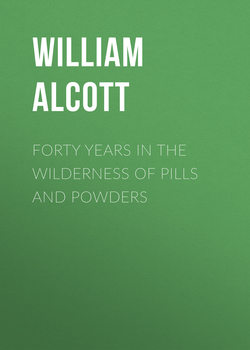Читать книгу Forty Years in the Wilderness of Pills and Powders - Alcott William Andrus - Страница 18
CHAPTER XVI
THE VIPER STORY
ОглавлениеI was, early in life, greatly perplexed in mind by the oft-recurring question, why it was that in the hands of common sense men, every known system of medicine – even one which was diametrically opposed to the prevailing custom or belief, like that of Hahnemann, seemed to be successful. Not only the botanic practitioner with his herbs, and the homœopathist with his billionth dilutions, but even the no-medicine man2 could boast of his cures, and, for aught I could see, of about an equal number – good sense and perseverance and other things being equal. And then, again, he that bled everybody, or almost everybody, if abounding in good sense, like the late Dr. Hubbard, of Pomfret, in Connecticut, was about as successful as those who, like Dr. Danforth, once an eminent practitioner of Boston, would bleed nobody, nor, if in his power to prevent it, suffer the lancet to be used by anybody else.
While cogitating on this subject one day, the following anecdote from a surgical work – I think a French work – came under my eye, and at once solved the problem, and relieved me of my difficulty. It may probably be relied on.
When the Abbé Fontana, a distinguished medical man and naturalist, was travelling, once, in some of the more northern countries of Europe, he was greatly surprised to find such a wonderful variety of applications to the bite of the viper, and still more to find them all successful, or at least about equally so. Even those that were in character diametrically opposed to each other, all cured. His astonishment continued and increased when he found at length that those who applied nothing at all recovered about as readily as any of the rest.
In the sequel, as the result of diligent and scientific research, it turned out that the bite of this animal, however dangerous and fatal in hot climates, is scarcely dangerous at all in cold ones. Hence it was that all sorts of treatment appeared to cure. In other words, the persons who were bitten all recovered in spite of the applications made to their wounds, and generally in about the same period of time.
Thus, as I began to suspect, – and the reader must pardon the suspicion, if he can, – it may be with our diversified and diverse modes of medical treatment. A proportion of our patients, – perhaps I should say a large proportion, – if well nursed and cared for and encouraged, would recover if let alone so far as regards medicine. And it is in proof of this view, that nearly as many recover under one mode of practice, provided that practice is guided by a large share of plain, unsophisticated sense, as another. And does not this fully account for a most remarkable fact?
Hence it is, too, – and perhaps hence alone, – that we can account for the strange development in Boston, not many years since, during a public medical discussion; viz., that he who had given his tens of pounds of calomel to his patients, and taken from their arms his hogsheads of blood, had been on the whole about as successful a practitioner as he who had revolted from the very thought of both, and had adopted some of the various forms of the stimulating rather than the depleting system.
"Is there, then, no choice between medication and no-medication? For if so, what necessity is there of the medical profession? Why not annihilate it at once?"
My reply is, – and it would have been about the same when these discoveries began to be made, – that there is no occasion to give up the whole thing because it has been so sadly abused. Every mode of medical practice, not to say every medical practitioner from the very beginning, has been, of necessity, more or less empirical. The whole subject has been involved in so much ignorance and uncertainty, that even our wisest practitioners have been liable to err. They have been led, unawares, to prescribe quite too much for names rather than for symptoms; and their patients were often glad to have it so. And were the whole matter to come to an end this day, it might well be questioned whether the profession, as a whole, has been productive of more good than evil to mankind. But then, every thing must have its infancy before it can come to manhood. And it is a consolation to believe that the duration of that manhood always bears some degree of proportion to the time required in advancing from infancy to maturity.
Medicine, then, as a science, is valuable in prospect. And then, too, it is worth something to have a set of men among us on whom we may fasten our faith; for, credulous as everybody is and will be in this matter of health and disease, till they can duly be taught the laws of hygiene, they will lean upon somebody; it is certainly desirable that they should rely on those whom they know, rather than upon strangers, charlatans, and conjurors, of whom they know almost nothing.
But I shall have frequent occasion to revert to this subject in other chapters, and must therefore dismiss it for the present, in order to make room for other facts, anecdotes, and reflections.
2
Of the hydropathist at that time I had not heard.
